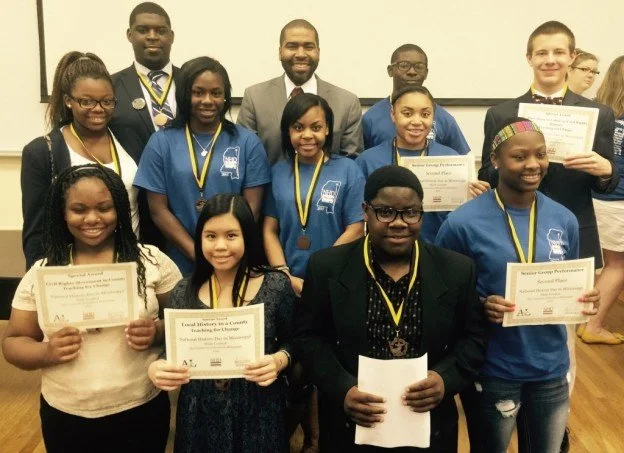National History Day — Focus on Local Mississippi History
Teaching Idea by Teaching for Change
Students have the opportunity to win awards for projects focusing on local history.
Students have the opportunity to win awards for projects focusing on local history.
Students can make a contribution to local history scholarship and awareness by researching and sharing untold stories of local history. They can also gain a greater sense of civic engagement, recognizing the role that “everyday people” have played in their own community’s history.
Researching local history also contributes to student understanding of the new Mississippi Department of Education (MDE) history framework. To help Mississippi students prepare local history projects for National History Day, here are local history awards, topic ideas, sample entries, and resources. Learn more about the National History Day competition in Mississippi.
Six Local History Awards
There are six local history awards, two each for projects that highlight a story in:
Civil Rights Movement (CRM) history from the student’s county;
labor history in the student’s county; and
a seldom told story in labor or civil rights history from anywhere in the state of Mississippi.
The entries can be based on oral histories, archival research, or other forms of researching and sharing local history. The awards will be for the student and the student’s teacher. The goal is to deepen student appreciation of and exploration of the untold stories and role of “everyday people” in local Mississippi history, using the National History Day competition as an incentive and a focus for student projects. The selection for these awards will be made on the same day as the state competition in Hattiesburg. Thanks to the W.K. Kellogg Foundation, winners will receive $100. Here are our 2015 winners.
Sharing History
We will make every effort to ensure that all the history projects (even those that are not award winners, as long as they meet certain standards) are shared in ways where they can add to the historical scholarship and public awareness of Mississippi’s local history.
Examples
Here are some examples of National History Day projects based on a local story with national implications and/or a little known story about Civil Rights Movement or labor history.
1961 Burglund High School Student Walkout
Film created by high school students in McComb, Miss. based on this historic student walkout, based on student collected oral history interviews. Watch film.
Anne Braden: Advocate, Radical, and Revolutionary
Website about longtime Louisville, Kentucky civil rights movement activist Anne Braden, produced by two students based on resources from the University of Louisville’s Ekstrom Library. Visit website.
Milwaukee Open Housing Campaign: A Revolution for Equal Opportunity.
Website about the struggle for fair housing in Milwaukee, Wisc., produced by a student based on reading books and use of the local archives. Website no longer online.
Researching History
Key sources of information are archives, universities, organizations, books, and oral histories from individuals. To help get you started, here are:
Oral history collection guides and resources for the classroom.
Archives, books, and organizations on the Civil Rights Movement and labor history in Mississippi.
Topic Ideas
We have developed a list of sample topics on labor and civil rights stories in Mississippi history that either need more research for the historical record or have not received sufficient national attention. These are only suggestions, there are many more stories in Mississippi history that would be ideal for National History Day projects.
People
African American elected officials
Major African American office holders during and after Reconstruction.
Civil Rights Movement veterans
Civil Rights veterans from Mississippi. See national list of veterans at CRMvet.org, search for those in Mississippi.
The Trail of Tears
The forced removal of American Indians from Mississippi in the early 1800’s.
1927 Flood
The 1927 flood was a pivotal event in the history of Mississippi and the country. Read the article The Flood of 1927 and Its Impact in Greenville, Mississippi at Mississippi History Now. Additional resources are the book Rising Tide: The Great Mississippi Flood of 1927 and How It Changed America and the films Fatal Flood and The Great Flood.
Self-Defense
This Nonviolent Stuff’ll Get You Killed provides many examples of armed self defense in Mississippi.
Key People and Places inAfrican American History
See list on BlackPast for people, places, and groups in Mississippi.
Pullman Porters and the Brotherhood of Sleeping Car Porters
The Brothers of Sleeping Car Porters was, in 1925, the first labor organization led by blacks to receive a charter in the American Federation of Labor (AFL). There has been a lot written about the Pullman Porters nationally. But what is the story of the Pullman Porters work and union organizing in Mississippi? One place to begin your research is the Pullman Porter Museum.
Railroad workers
Mississippi has a long history with railroads in conjunction with the lumber industry. There are many individuals and groups that contributed to this history. From Simeon Webb to the Mississippi Central Railroad, a NHD topic on railroads would provide many primary sources in the immediate area.
War resistance in Mississippi (WWI, WWII, Vietnam)
Were 1,200 African-American troops killed at Camp van Dorn in 1943? The Slaughter: An American Atrocity focuses on the events at Camp van Dorn, Mississippi. The documentary Mystery of the 364th also sheds light on the event.
White allies in Civil Rights Movement
When the Heffners, a white family in McComb, hosted civil rights workers at their home the white residents ran the family out of town. This event was chronicled in the book So the Heffners Left McComb by Hodding Carter.
Women in social movements
Civil Rights, labor, women’s suffrage, anti-war, etc.
Organizations and Projects
Churches role in social movements
Civil Rights organizations
COFO, SNCC, SCLC, NAACP, CORE
Federal Bureau of Investigation
Freedom Schools
Curriculum at Education and Democracy website. Books and articles about Freedom Schools.
Free Southern Theater
SNCC members John O’Neal and Doris Derby join actor/journalist Gilbert Moses and thespians at Tougaloo College formed the Drama Workshop, which grew into the Free Southern Theater (FST). Racially integrated and dedicated to social change, the FST took live theater to poor, rural, mostly Black audiences across Mississippi, Louisiana, Tennessee, and Georgia.
Historically Black Colleges role in social movements
Alcorn State University, Coahoma Community College, Hinds Community College at Utica, Jackson State University, Mississippi Valley, Rust College, Tougaloo College
Mississippi Freedom Democratic Party
In early 1964, as part of Freedom Summer, Mississippi civil rights activists affiliated with the Council of Federated Organizations (COFO) in Mississippi launched the Mississippi Freedom Democratic Party (MFDP). Claiming status as ‘‘the only democratically constituted body of Mississippi citizens,’’ they appealed to the credentials committee of the Democratic National Convention (DNC) of 1964 to recognize their party’s delegation in place of the all-white Democratic Party delegation from Mississippi (Victoria Gray, July 1964).
NAACP – Mississippi
The Mississippi State Conference was on the forefront of all the major battles of the civil rights movement in Mississippi during the 50’s, 60’s and 70’s through and collaborating with other civil rights organizations to organize demonstrations, protests, selective buying campaigns, sit-ins, marches and legal action, all aimed at securing equal rights under the law for ALL citizens of the state.
State Sovereignty Commission
The Mississippi State Sovereignty Commission functioned as the state’s official counter civil rights agency from 1956-1973. Learn about history and see files online at MDAH.
Southern Tenant Farmers Union
The Southern Tenant Farmers Union (STFU) was founded in Tyronza, Arkansas in July 1934 by black and white tenant farmers and Socialist Party members. The STFU is part of a rich tradition of labor organizing in the Depression-era South amongst mostly Black agricultural laborers.
White Citizens’ Councils
In response to the 1954 Brown v. Board of Education decision ending school segregation, white segregationists throughout the South created the White Citizens’ Councils (WCC). These local groups typically drew a more middle and upper class membership than the Ku Klux Klan and, in addition to using violence and intimidation to counter civil rights goals, they sought to economically and socially oppress blacks.
Youth Councils-NAACP
The NAACP Youth Councils in Mississippi laid the groundwork for the success of the more visible Civil Rights Movement in the 1960s. Sample questions and more info.
Themes
Education
This includes Rosenwald schools (film and database), desegregation, critique of textbooks, freedom schools, book clubs, and more.
Environmental Justice
Coalition of Communities for Environmental Justice, Center for Environmental and Economic Justice, Bridge the Gulf Project
International connections to local movements
For example, Fannie Lou Hamer’s visit to Guinea in 1964; SNCC’s 1966 Statement against the Vietnam War; and the relationship between SNCC and African independence movements, described in this scholarly article.
Media – African American Press
Music and Art in Social Movements
Native American sovereignty
The official website of the Mississippi Choctaw Indian Tribe. Get a detailed history of the Choctaw (including the Mississippi Band of the Choctaw). Also, Native American Nations MS Choctaw.
Reconstruction
Sports
The NCAA matchup between Loyola University of Chicago and Mississippi State in 1963 helped put an end to segregated basketball. Loyola’s win 50 years ago became known as the “game of change.”
Voting Rights Struggles
See key stories and individuals from 1963. See key individuals from Mississippi.

